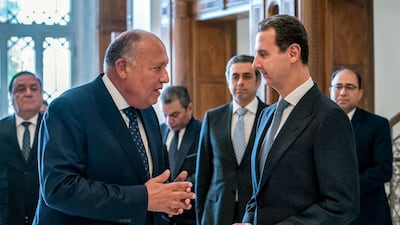Egyptian Foreign Minister Sameh Shoukry visited Syria and Turkey on Monday to show Cairo's solidarity with the two earthquake-stricken nations, in a move that signalled a further thaw in relations.
It was the first official visit by an Egyptian foreign minister to Syria since the outbreak of its civil war in 2011 and the first to Turkey since the breakdown in relations between Cairo and Ankara in 2013.
Mr Shoukry visited Syria first, meeting President Bashar Al Assad and his Syrian counterpart Faisal Mekdad, who received him at Damascus airport.
His visit was the latest sign that Syria's isolation in the Arab world is slowly easing after more than a decade of its ostracisation.
Syria was suspended from the Cairo-headquartered Arab League in 2011 following the Syrian government's heavy-handed response to street protests against Mr Assad that escalated into civil war.
The conflict has killed more than 300,000 people and displaced half the country’s population of 23 million.
Egypt has consistently called for a “political solution” in Syria and steered clear of discussing the fate of Mr Assad, whose departure has long been demanded by several Arab leaders.
Speaking to reporters after meeting the Syrian President, Mr Shoukry said Egypt had sent 1,500 tonnes of aid to survivors of the February earthquake and pledged more help.
“We will continue to provide whatever humanitarian aid we can”, he said.
When asked why Cairo had not yet normalised ties with Damascus, he said his visit was “first and foremost humanitarian”.
The 7.8-magnitude earthquake that hit southern Turkey on February 6 claimed more than 44,000 lives in Turkey and more than 6,000 in Syria, mostly in the rebel-held north-west region. Millions were left homeless.
Egyptian President Abdel Fattah El Sisi called Mr Al Assad soon after the quake, in the first public direct contact between the two leaders in at least a decade.
Another sign of Syria's reintegration came on Sunday when the speakers of several Arab parliaments visited Damascus to show solidarity after the earthquake.
Egypt's Parliament Speaker said during the visit that Syria would soon regain its seat in the Arab League, without elaborating.
Mr Assad has received an outpouring of Arab support for his country since the quake hit.
Foreign Minister Ayman Safadi of Jordan, which once backed the Syrian opposition, visited Damascus for the first time since the civil war began.
Washington has voiced opposition to any moves towards rehabilitating or normalising ties with Mr Assad, citing his government's brutality during the conflict and the need to see progress towards a political solution.
Mr Shoukry's visit to Turkey also underlines a thaw in Egypt's ties with Ankara.
Egypt and Turkey cut diplomatic ties in 2013 after Egypt's military, then led by Mr El Sisi, removed the Muslim Brotherhood's Mohammed Morsi from the presidency. Mr Morsi had enjoyed Turkish support during his one year in office.
Mr El Sisi and Turkish President Recep Tayyip Erdogan met in Qatar during the Fifa World Cup in November. Both men then promised to work together towards improving relations.
The two regional powerhouses back rival sides in the conflict in Libya, Egypt's neighbour to the west that has been torn by more than 10 years of divisions and civil strife.
Egypt is also opposed to what it sees as Turkey's meddling in neighbouring Syria and Iraq, and its attempts to muscle in on plans by Cairo and its allies to turn the East Mediterranean, where vast natural gas reserves have been found, into a regional energy hub.

But those differences were absent from comments by Mr Shoukry and his Turkish counterpart Mevlut Cavusoglu on Monday when they spoke to reporters in front of an Egyptian aid ship docked at the southern Turkish port of Mersin.
“Our visit is a message of friendship and solidarity”, Mr Shoukry said.
“We, as the Egyptian government and the Egyptian people, wholeheartedly believe that Turkey will overcome this as soon as possible. It is a great disaster”, he said.
“We will continue to do our best to help”.
Mr Cavusoglu made similarly upbeat comments, describing Mr Shoukry's visit as “extremely important and meaningful”.
“We open new pages in our relations with Egypt”, he said.
“We discussed what steps we would take to improve relations. The development of relations between Turkey and Egypt is in the interest of both parties. It is also extremely important for the peace, development and stability of our region.”







